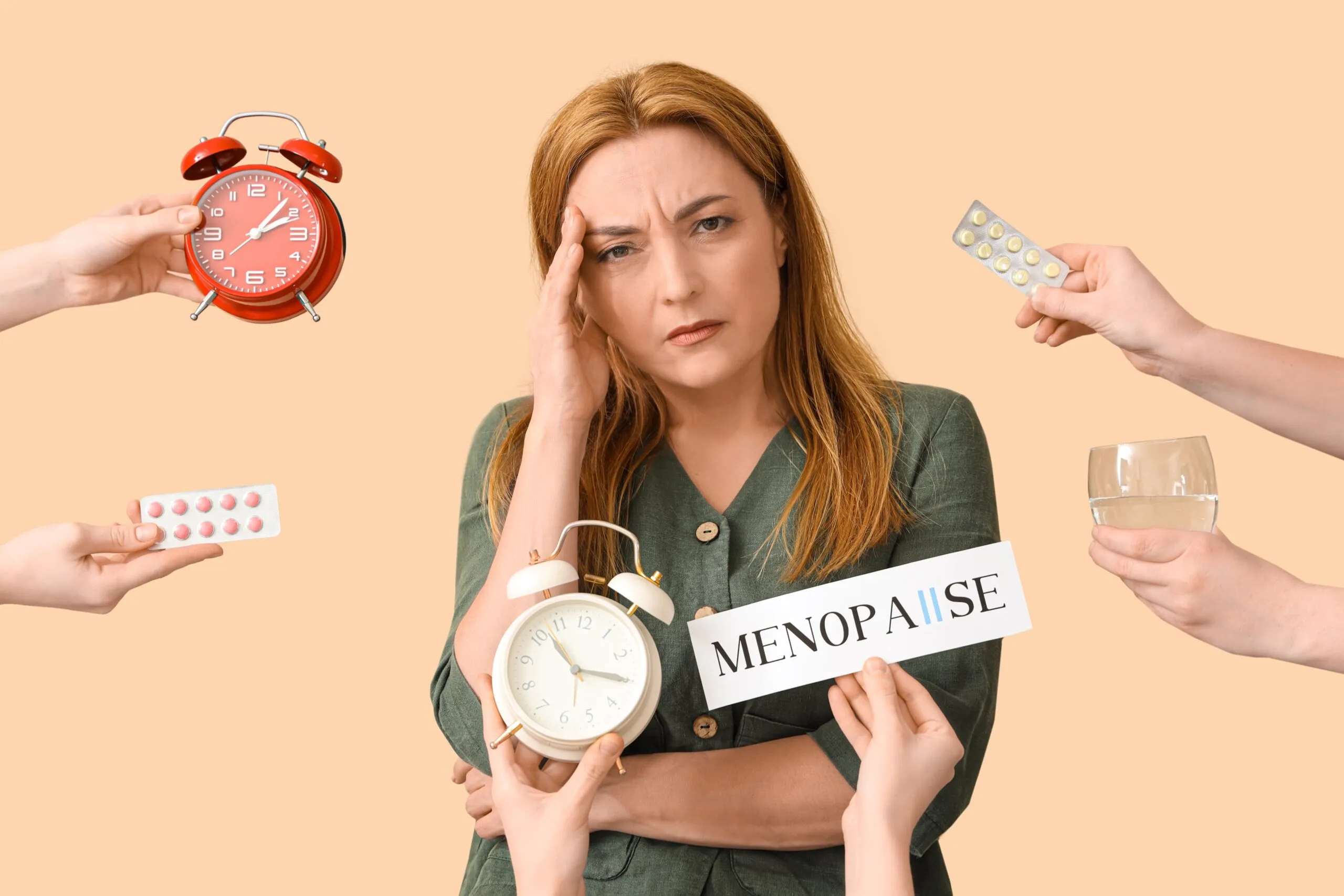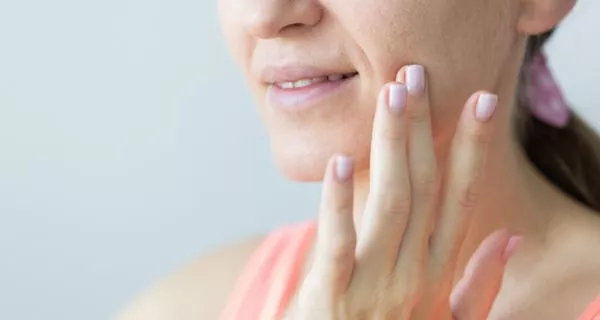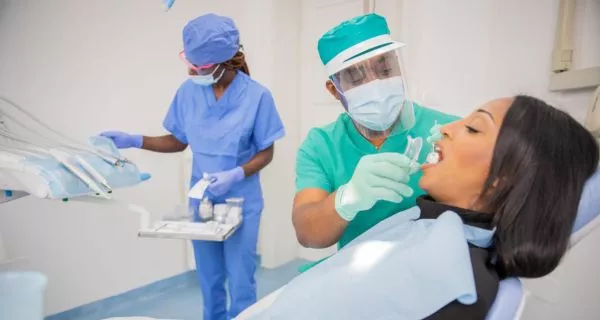Last Updated on: 5th November 2025, 08:41 am
The stages of menopause affect more than just your hormones; they also change your oral health. Each stage brings different effects on your gums, saliva, and jawbone. By understanding these stages and taking simple daily steps, you can protect your teeth, gums, and smile for life.
Menopause is a natural stage in every woman’s life, affecting approximately 1.3 million women each year in the United States alone.
While many associate it with hot flashes and changes in menstrual cycles, its impact goes beyond basic symptoms. Studies show that up to 40% of menopausal women experience dry mouth or gum problems, increasing the risk of cavities, periodontal disease, and bone loss.
Understanding how menopause affects oral health can prevent complications and improve quality of life. Maintaining a healthy smile requires tailored strategies for each stage, from perimenopause to postmenopause.
What is menopause?
Menopause is a natural stage in every woman’s life. It marks the end of menstrual cycles, usually between ages 45 and 55.
It is confirmed after 12 consecutive months without a period, when the ovaries stop releasing eggs and estrogen and progesterone levels drop significantly.
What are the common symptoms of menopause?
- hot flashes and night sweats
- mood swings or irritability
- weight changes and fatigue
- trouble sleeping or concentrating
However, menopause affects more than your body; it can also change your oral health. Estrogen supports healthy gums, keeps saliva flowing, and helps maintain strong jawbones. When estrogen drops, you may notice dry mouth, gum pain, burning sensations, or tooth sensitivity.
Understanding menopause and its symptoms is important for protecting your teeth and gums during each stage.
How does estrogen affect oral health?
Estrogen is a key hormone for maintaining healthy gums, teeth, and jawbones. It:
- improves blood flow to gums
- reduces inflammation
- maintains bone density in the jaw
When estrogen levels decrease during menopause, it can lead to these results:
- Gums are more likely to develop gingivitis or periodontitis
- The jawbone may lose mass, making teeth loose or unstable
- Healing after dental procedures slows down
Because estrogen affects so many aspects of oral health, dentists often recommend regular checkups, preventive gum care, and monitoring bone health throughout all stages of menopause to reduce risks.
How does menopause affect oral health?
Menopause is a natural, gradual process that affects every woman differently. It usually happens in three main stages:
- Perimenopause: the transition phase before your final period.
- Menopause: when menstruation has completely stopped for 12 months.
- Postmenopause: the stage after menopause that lasts for the rest of your life.
Each stage impacts your body, and your mouth, differently.
1. What happens to your mouth during perimenopause?
- Timeline: Usually in your 40s, lasting several years before your final period
- Hormonal changes: Estrogen levels rise and fall unevenly, causing irregular periods and early menopause symptoms
- Oral health effects:
- dry mouth, which increases risk of cavities and bad breath
- swollen or bleeding gums while brushing or flossing
- metallic or bitter taste in the mouth
- Tips for care:
- Drink water frequently to stay hydrated.
- Use alcohol-free mouthwash to avoid irritation.
- Brush gently with fluoride toothpaste twice a day.
- Eat crunchy fruits and vegetables to naturally clean teeth.
2. What happens to your mouth during menopause?
- Timeline: After 12 consecutive months without menstruation
- Hormonal changes: Sharp, permanent drop in estrogen and progesterone
- Oral health effects:
- burning mouth syndrome (tingling or pain in tongue or lips)
- gum recession, exposing roots and increasing tooth sensitivity
- jawbone loss, which can loosen teeth or cause shifting
- Tips for care:
- Visit your dentist every 6 months.
- Discuss calcium and vitamin D supplements with your doctor.
- Avoid smoking and limit alcohol.
- Use a soft toothbrush and brush carefully.
3. What happens to your mouth during postmenopause?
- Timeline: Begins one year after your final period and continues for life
- Hormonal changes: Low and steady hormone levels, with long-term effects
- Oral health effects:
- persistent dry mouth, increasing risk of cavities and infections
- jawbone loss from osteoporosis, affecting dentures or implants
- slower healing after dental procedures
- Tips for care:
- Keep regular dental cleanings and exams.
- Use moisturizing mouth sprays or gels.
- Avoid tobacco and alcohol.
- Maintain a diet rich in calcium, vitamin D, and antioxidants.
Hormonal changes during menopause affect gums, teeth, and jawbone. Being aware of these changes and maintaining good oral care helps protect your smile as you move through each stage.
What are common oral problems during menopause?
Menopause brings hormonal changes that can affect your mouth in various ways. Some common oral problems include:
- Dry mouth (Xerostomia): Less saliva leads to more bacteria, bad breath, and higher cavity risk.
- Gum disease (gingivitis or periodontitis): Hormone fluctuations make gums more sensitive, swollen, or prone to bleeding.
- Burning mouth syndrome: Tingling or burning sensations in the tongue or lips, often without visible sores.
- Changes in taste: Foods may taste metallic, salty, or bitter.
- Jawbone loss: Thinner bone structure can cause loose teeth or poorly fitting dentures.
Recognizing these issues early allows for timely treatment and better long-term oral health.
How can you protect your oral health during menopause?
Changes in hormones during menopause can affect oral health, but you can still enjoy a strong, healthy smile with the right routines.
What daily habits help maintain oral health?
Maintaining oral health during menopause is about adopting good habits, organized in a way that makes them easy to follow.
Stay hydrated and stimulate saliva
- Drink plenty of water throughout the day.
- Chew sugar-free gum to increase saliva flow and reduce dryness.
Maintain gentle oral hygiene
- Brush softly with fluoride toothpaste twice a day.
- Floss carefully to prevent gum damage.
- Use moisturizing gels or sprays to soothe dry or burning areas.
Eat a nutrient-rich diet
- Focus on calcium- and vitamin D-rich foods such as yogurt, fish, and green vegetables
- Limit caffeine, alcohol, and tobacco, which can worsen dryness and gum issues.
Manage stress and protect teeth
- Practice relaxation techniques, since anxiety can lead to teeth grinding and gum inflammation.
Small, consistent daily habits can prevent long-term oral problems and keep your mouth comfortable.
Can hormone therapy improve oral health?
Hormone Replacement Therapy (HRT) is a medical treatment that helps balance estrogen and progesterone levels when they drop during menopause. This can benefit both overall and oral health.
Possible oral health benefits:
- improves blood circulation and reduces inflammation in the gums
- decreases dry mouth
- helps maintain jawbone density
- reduces the risk of gum disease
Important considerations:
- Not all women are suitable candidates for HRT.
- It must be prescribed and monitored by a doctor.
- Side effects are possible if not used correctly.
Talk to your gynecologist and dentist to see if this treatment is right for you and how it can help maintain a healthy smile during menopause.
How can you keep your smile healthy through menopause?
- Menopause affects both your body and your oral health.
- Each stage, perimenopause, menopause, and postmenopause, presents its unique challenges.
- Regular dental visits, proper hydration, gentle oral hygiene, and a balanced diet help protect teeth and gums.
- Pay attention to small changes in your mouth, early action prevents bigger problems later.
When should you see a dentist?
You should visit your dentist if you notice:
- constant dry mouth
- gum bleeding, swelling, or pain
- burning or tingling in your tongue
- loose teeth or discomfort when chewing
A dentist can:
- Check your bone density with dental X-rays.
- Recommend fluoride or antimicrobial treatments.
- Suggest products to relieve dryness.
- Coordinate with your doctor if you are using hormone therapy.
Getting dental advice early helps protect your teeth through every stage of menopause.
Where can I find a trusted dentist?
Finding a trusted dentist is easier with Find Dentist. Whether you need care at home or while traveling, Find Dentist connects you with verified clinics and professionals worldwide, experienced in women’s oral health during menopause.
This ensures that your dental care is safe, personalized, and effective, helping you maintain a healthy smile through every stage of life.
How can you protect your smile through the stages of menopause?
The stages of menopause bring many changes, but your smile doesn’t have to suffer. By learning how each stage affects your oral health, from dry mouth to gum sensitivity, you can take action early.
Good daily care, healthy nutrition, and regular dental checkups will help you stay ahead of problems. With the right habits and professional support, you can keep your smile strong, fresh, and confident through every stage of menopause and beyond.
Frequently Asked Questions
Does dry mouth during menopause increase the risk of cavities?
Why do my gums bleed more during menopause?
Can menopause cause a burning sensation in my mouth?
How often should I visit the dentist during menopause?
Are there lifestyle changes that can improve oral health during menopause?
Voice and Search (Q&A)
What are common oral problems during menopause?
Women often experience dry mouth, gum disease, burning mouth syndrome, changes in taste, and jawbone loss.
Does menopause affect dental implants?
Jawbone loss during menopause can impact implants. Regular checkups and maintaining bone health are important.
Can menopause cause bad breath?
Yes, dry mouth and gum issues can contribute to bad breath. Good oral hygiene and hydration help manage it.
Share
References
1. Adam, M., & Wooton, J. (2022). Menopause and oral health. BDJ, 233(3), 170. https://doi.org/10.1038/s41415-022-4568-0
2. Cherney, K. (2025a, May 5). How menopause affects your oral health. Healthline. https://www.healthline.com/health/menopause/menopause-and-sensitive-teeth
3. Dutt, P., Chaudhary, S., & Kumar, P. (2013). Oral Health and menopause: A comprehensive review on current knowledge and associated dental management. Annals of Medical and Health Sciences Research, 3(3), 320. https://doi.org/10.4103/2141-9248.117926
4. Gordon, C. (2025, August 4). Menopause can affect your mouth — 6 symptoms to watch for. Healthline. https://www.healthline.com/health/menopause/menopause-mouth-symptoms
5. Thomas, N., Peters, K., Reilly, K. O., Sousa, M. S., & George, A. (2024). Oral health care among women in perimenopause or menopause: an Integrative review. Journal of Midwifery & Women S Health, 70(1), 17–31. https://doi.org/10.1111/jmwh.13668
-
Dr. Yeidy Carolina Mesa [Author]
DDS Yeidy Carolina Mesa Passionate Dentist | Advocate for Accessible Oral Health Education Graduating from Universidad CES in 2022, I am a dedicated general dentist with a lifelong passion for helping others and making a meaningful impact in the world. My journey into dentistry began at the age of 7, inspired by my own experience with braces and overcoming a fear of the dentist. This personal journey shaped my mission to help patients conquer their own dental anxieties and embrace a healthier,...
View all posts
-
Nayibe Cubillos M. [Medical Reviewer]
Pharmaceutical Chemestry |Pharmaceutical Process Management | Pharmaceutical Care | Pharmaceutical Services Audit | Pharmaceutical Services Process Consulting | Content Project Manager | SEO Knowledge | Content Writer | Leadership | Scrum Master
View all posts
A healthcare writer with a solid background in pharmaceutical chemistry and a thorough understanding of Colombian regulatory processes and comprehensive sector management, she has significant experience coordinating and leading multidisciplina...






















